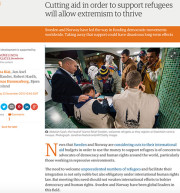
This page summarizes cases raised with Norway by the Special Rapporteur between May 1, 2011, (when the Special Rapporteur took up his functions) and February 28, 2017 (the date of the last public release of communications). Communications are released to the public once per year. This page also contains observations on these communications and on responses received from Norway. Communications and observations are divided into sections based upon which observation report they originally appeared. Each communication is referenced as urgent appeal (UA), allegation letter (AL), joint urgent appeal (JUA) and joint allegation letter (JAL) – the hyperlinks lead to these documents. This is followed by the date the communication was issued, as well as the case number and the State reply (also hyperlinked if available). Summaries and communications are published only in the language of submission (in the case of Norway, English). First Report (May 1, 2011 to March 15, 2012) None Second Report (March 16, 2012 to February 28, 2013) None Third Report (March 1, 2013 to February 28, 2014) None Fourth Report (March 1, 2014 to February 28, 2015) None Fifth Report (March 1, 2015 to February 28, 2016) Joint allegation letter, 24/07/2015. Case no. NOR 1/2015. State reply: 22/09/2015. Alleged... Continue reading →

UN Special Rapporteur Maina Kiai has co-authored a commentary for the Guardian's Global Development blog urging the governments of Sweden and Norway not to cut international development aid to support the recent influx of refugees. The piece was co-authored by former Council of Europe Commissioner for Human Rights Thomas Hammarberg, former Swedish ambassador for human rights Jan Axel Nordlander, Civil Rights Defenders executive director Robert Hardh; and Norwegian Helsinki Committee secretary general Bjørn Engesland. Sweden is currently studying the potential effects of cutting its aid budget by up to 60%, while Norway is reportedly looking at a roll-back of approximately 21%. The authors note that both countries are among the most generous in the world in terms of foreign aid - particularly when it comes to giving directly to civil society. Sweden, for example, dedicates roughly one-sixth of its aid budget to civil society, including support for those working on democracy-building and human rights. Reducing this support would decimate civil society at a time when such support is most needed. "The consequences of a weakened global civil society movement could ultimately come back to haunt Sweden and Norway," the authors write. "Funding independent civil society in other countries is not just... Continue reading →